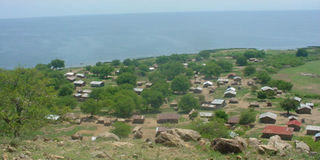Govt cancels land titles issued in past 7 years

Disputed. An aerial view of land in the Albertine graben where oil is being explored and sporadic land wrangles have escalated. PHOTO BY FRANCIS MUGERWA
What you need to know:
The rescinding of the titles comes seven years after President Museveni gave a verbal moratorium on land transactions in Buliisa District following complaints about oil speculators who were both grabbing and buying chunks of land from Buliisa residents
KAMPALA.
In what can be interpreted as a step toward addressing the land wrangles in the oil rich Buliisa, government has cancelled land titles for 5090 hectares issued between December 2010 to February 2017.
The rescinding of the titles comes seven years after President Museveni gave a verbal moratorium on land transactions in Buliisa District following complaints about oil speculators who were both grabbing and buying chunks of land from Buliisa residents.
“The District Land Board should rescind all the minutes issued when the ban was [subsisting] for the period December, 2010-2017 within two weeks. The decisions of the board should be minuted. The two weeks shall commence on 1st March, 2017,” reads the letter the minister of lands, Betty Amongi, wrote to the Buliisa District leaders, including the district RDC.
It ends, “Should there be any delay due to reasonable factors, revert to me for extension of time; in any case, not more than additional one (1) week.”
The major cause of land struggles in Buliisa is that whereas the area is ripe with oil fields and therefore prone to moneyed land buyers, the Buliisa District land board was giving land title approvals within out informing residents and other stakeholders which is contrary to the land act. Section 4 of the land (amendment) act makes such a transaction void.
Ms Amongi’s letter notes that flagrant disregard of the law could be because of “a cartel of land grabbers being facilitated by the District Land Board; the area land committee; plus the District Police Commander who have abused the rights of the community.”
She, however, is aware that there could be people who bought land legally. Those, she said in her letter, “can re-apply through the proper procedures.” For those who could have followed the right procedures but their approvals were made during the period of December 2010 to date, she added, their titles will still be affected by the halt; “they too should regularise their approvals.”
The minister’s directive will affect over 160 land lords the biggest being Mr Francis Kaahwa who is said to own almost half of the now forceless titles.
Government is ready for any legal action that might arise from the directive.
“The minister of land, housing and urban development shall liaise with ministry of energy and mineral development and the Attorney General to handle all court cases and court orders arising out of this matter,” Minister Amongi’s letter reads in part.
Ignorant
Speaking to Daily Monitor, Secretary Buliisa District Land Board Rogers Balemesa feigned ignorance over the directive, insisting the district leadership will implement it after officially receiving it.
“The fact is I am hearing about the letter from journalists but I don’t have a copy, the CAO requested for formal communication,” Mr Balemesa said.
Land has always been the cause of conflict in oil producing countries in Sub Saharan Africa. There have been simmering conflict in the Albertine Graben in places like Rwamutongo in Hoima and in Buliisa itself where people have raised their voices complaining about ‘foreigners’ buying off their land and throwing them off it to pave way for oil and gas development projects.
Welcoming the directive, Buliisa County MP Stephen Mukitale—who has been at the centre of fighting for the people’s land in the district, said the decision will once and for all deal with “mafia” who are grabbing land in the region.
“The mafias are holding government and the oil companies to ransom, who are terrorising the communities through a commission agent called Francis Kaahwa,” Mr Mukitale said, adding that the mafia network is well webbed with the district police commander, Resident District Commissioner working to extort Shs300 billion from oil companies in compensation. “We don’t want another Biafra war here, the land must be registered as communal land then the oil companies can begin working,” Mr Mukitale said.
Not affected
Tullow Oil boss Jimmy Mugerwa said although he has not seen a copy of the minister’s directive, it will not affect the company’s activities because “oil companies do not buy land but acquire directly from government.”
He promised to get a detailed statement in case he officially gets a copy of the directive.
Mr Henry Mbazira, the founding chairperson of the civil society coalition on oil and gas, however, says although the rescinding should be welcome, it could be a ploy by government to prepare for compulsory taking of people’s land for investment— a move government is trying to legalize through an amendment in the Land Act.
“The fact that they have rescinded the titles that were becoming a source of conflict in the Graben is a good thing in a sense that the original owners will come in and make it proper. But it will also put government in a tricky situation where people borrowed land to acquire land will want to pay their loans.
“There have also been some cases of government officials buying land in Buliisa and in Hoima. Is the rescinding of all titles a solution to the land question in Bunyoro? Given the fact that government wants to amend the act to allow for compulsory taking of land, I see it as a preparation for government to take land from people without giving them a time frame for compensation,” he said.




